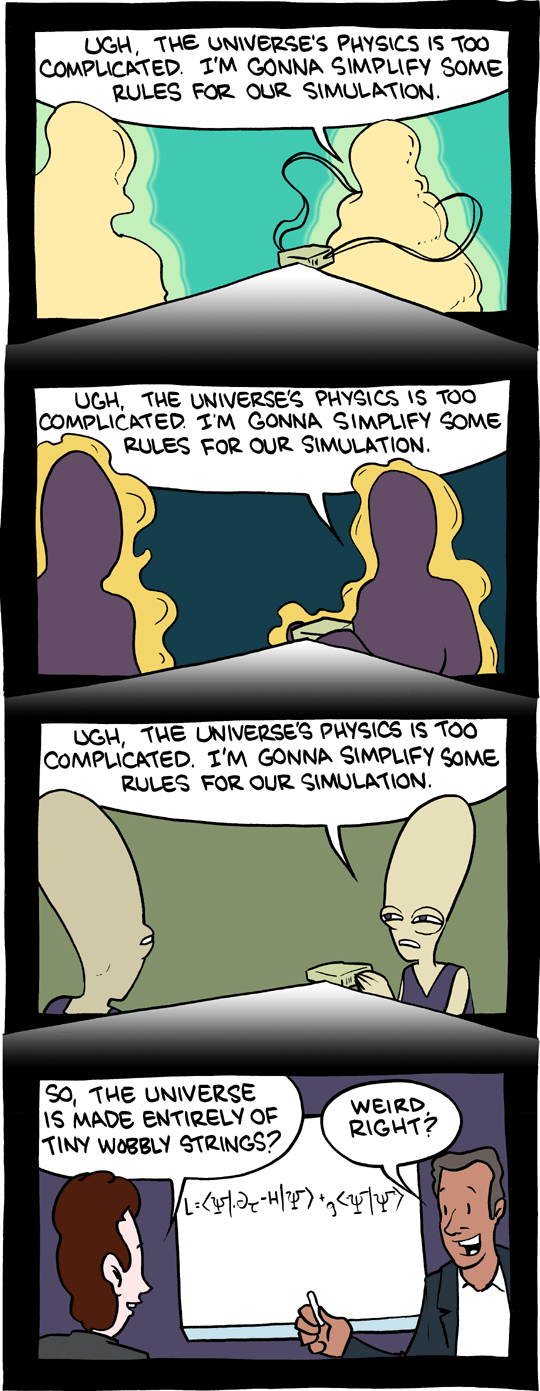I think you know the simulation hypothesis. Our universe could be a simulation created by… well, let’s call them “gods”.
But, if the simulation continue, we, humans, may reach the point where we could create a simulation of our own universe. In which, the simulated people would reach the point where they simulate their universe, etc…
So, as a corollary, it is not possible to simulate the entire universe, because this imply simulating an infinity of entire universe. It is only possible to simulate a simpler, smaller universe at each “layer”.
So my question, are we at the top of the stack, or at the bottom ? Which would imply a much bigger and much more complexe universe above us.
42, obviously
8
I’ve also wondered about this too. In my opinion, at least several layers, but not more than 25. No good reason, it just feels right to me.
I disagree with your corollary. We don’t know the rules of the universe that our simulated universe resides in. We could be the first layer or an infinitely lower layer, and there would be no way of knowing.
Agree, we don’t know the rule of layer above ours. It has been demonstrated that Mathematics are the same at any point of our universe, but I’m not aware of anything outside of universe. And I doubt this could be even demonstrable.
At least, we are sure that, starting from ou layer, there is a finite number of possible layer below.
The fact that light speed is actually the speed of causality is pretty compelling evidence that our universe is a simulation and that’s the clock speed of the CPU or the set simulation speed…
That being said, I think it’s more fucked than that. The simulation could be more recursive and fractal. Like, some universe can be a projection of another universe that’s projected by another universe, but somehow you land back to itself.
If we do the analogy with CPU, then plank time is CPU clock, and plank length the discretisation of field, a bit like floating point precision. At each clock, causality influence the cell next to her.
But in this case, why the universe so huge and why speed of light so slow ?
I mean, speed of light is fucking slow compared to universe, but quite instantaneous at our scale. It seems like the simulation has been designed to work well at our scale. So, are we the subject of the simulation, or an unexpected side effect ?
Im in the camp that god is an nth dimensional programmer and we are the expirament.
I like the fractal idea. In the end it’s just a question of taste imo
Odds are we are one of the many layers and not the top.
Infant its infinite to one odds
If you are assuming we live in a simulation, then you have to assume everything else about it too - there is no evidence to point in any direction about anything higher than our own layer, so ours is the only one we can do science on. All else would be imagination, so make up whatever you like.
I do agree though that a simulator can’t fully simulate itself, so yeah, it would have to be bigger and more complex in at least some way, which could simply be runtime.
I don’t know, Timmy, being God is a big responsibility
Holy fucking shit ! I just fall into this rabbit hole, I was suppose to mow the lawn and go to the dump this morning, my wife will kill me 😅
When you do things right, people won’t be sure you’ve done anything at all.
Definitely layer 7.
The Loosh Farm.









